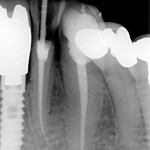
Pain is not an uncommon experience during orthodontic treatment, and has been reported as a cause of treatment discontinuation. The aim of the study was to assess the efficacy of a cognitive behavioural therapy (CBT) intervention for patients experiencing pain during orthodontic treatment. Eligible patients were randomised into three groups CBT intervention(n=150), ibuprofen intervention(n=150), and [read the full story…]




